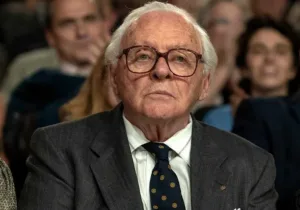Os Guinness once asked, “Have you ever heard an atheist exclaim ‘Goddamnit!’ and really mean it?” In certain instances, the blasphemy isn’t blasphemous; it’s an unwitting prayer. There I was, a college kid, having thought I had abandoned my childhood belief in God and now reeling on my intellectual heels by an encounter with overwhelming malice. I was taking a course on the Holocaust and found myself disequilibrated by the clear, raw, and obvious fact—the “intuitive flash,” as Guinness put it—that what I was encountering was evil and had to be resisted and rejected categorically. I knew—I knew—that Auschwitz was not the way things ought to be. There I was, shaking my fist at the death camps and crying out to a God in whom I didn’t believe to condemn something that in my atheism I had no real grounds to hate.
I have commented before about a helpful conceptual frame called the “naïve impression” of evil. Contrary to contemporary usage, “naïve” here isn’t a pejorative term; rather, it describes an intuition that is unlearned, untutored, and untaught. In the face of an encounter with a sufficient evil, this naïve impression is the moral equivalent of the involuntary physical shudder one feels at sudden cold. It is made up of three overlapping components that occur nearly simultaneously but remain distinct: first, there is the sudden certainty that what ought not to be is; second, there follows the realization that we have a native preference for the way things ought to be; and third, there is the consequent rage that flares like tinder at what this evil has done to this good, and that ignites our indignation and demands remedy.
Auschwitz was the anvil on which my illusions were hammered away. The moral relativism necessary to sustain my atheism became unendurable. Evil, I realized, was not something I decided, but something I discovered already defined. I did not want my fist-shaking anger at Auschwitz to only say something about me—I needed it to say something about Auschwitz. In the shadow of the crematorium, rage was an evangelist.
From St. Augustine, the late Jean Bethke Elshtain asserted that emotions are a mode of thought, embodied thought, and that we must remain cognizant of what the body is telling us because “the body is epistemologically significant.” She noted the importance of such intuitive responses when she warned against the excision of what the ethicist Leon Kass, in an essay on human cloning, called “the wisdom of repugnance.”
Elshtain affirmed Kass’ desire to get us to pay attention to what we find “offensive,” “grotesque,” “revolting,” and “repulsive” for it might alert us to deeper realities. Like Augustine, “Kass,” Elshtain writes, “is arguing for the potential epistemic value of strong reactions, like horror at the sight of torture scenes, or revulsion when we see self-mutilation.” Both Kass and Elshtain know we must not end with the emotion and that “revulsion is not an argument,” but they also insist neither ought we to discount it. In a culture increasingly allergic to moral judgment, Elshtain feared our capacity for repugnance is dwindling fast, a fear supported by those who criticized Kass for trying to make something theoretically substantive out of what they took to be a simply aesthetic reaction. But, Elshtain insisted in his defense, “the critique runs much deeper than that.” Repugnance points to that which offends something very deep within us; we are made instantly aware that “something really…fundamental has been violated.” Certain things simply ought-not-to-be. Sometimes we ought to shudder.
In his magnificent book The Rebel, Albert Camus suggests that the rebel is one who has reached a point in which he draws a line and insists, “Thus far, perhaps, but no further.” In doing so he is simultaneously saying no to the passing of that line but also yes—he is positively affirming the value and principles on the other side of that line. Today we observe the seventy-fifth anniversary of the liberation of the Auschwitz-Birkenau Nazi concentration camp. We have heard in the days leading to this event and will hear both today and in the days to follow a solemn invocation—a promise—a pledge that such evils will not be repeated. “Never again!” we will declare. We will draw a line. Deep down, we probably really mean it.
What will be lost to many—including too many Christians—is the fact that this pledge of “never again” is, if it is to mean anything at all, a promise to fight if, in the last resort and with the aim of peace, nothing else will protect the innocent, requite an injustice, or punish evil. Christianity is a fighting faith. It recognizes that God has given human government a ready sword to protect those whom the wicked would gather, and transport, and gas, and smolder.
Without a political sovereign ready to stand for justice, order, and peace, the political community would be anarchic and the weak would be eaten alive. Think of John Ford’s wonderful The Man Who Shot Liberty Valance. Recall the early plot: Ranse Stoddard is a young, idealistic attorney traveling by stagecoach to open a law practice in the town of Shinbone. His coach is robbed by the outlaw Liberty Valance, who brutally assaults Stoddard and leaves him for dead. Tom Doniphon comes along and finds Stoddard and brings him to an inn where he pays for him to be cared for. The storyline should sound familiar—it’s a retelling of the parable of the Good Samaritan. Here, however, we get what might have been the rest of the story. It is clear that without a measure of order in Shinbone, the law will be impotent. Doniphon, good with a gun, decides—for love’s sake—to give order a fighting chance. The Man Who Shot Liberty Valance considers the role a man of violence might play in helping to set the conditions necessary for justice and peace to flourish. Just so, “never again” is a commitment to establishing and maintaining those necessary conditions.
This means that “never again” is also a commitment to building the military capacity and public will to fight the necessary fights. It is a commitment to raising just war children willing to fight them. In our world, like it or not, power is set against contrary power. It is right to cultivate this power, which is simply the capacity to do something. Power is a positive good. Like any good, power can be perverted by human depravity. But the solution to the misuse of power is not the refusal to use it at all, but to use it properly. But it cannot be used if it has not been cultivated. America has cultivated great power. With it comes a corresponding responsibility. This is not an invitation to do stupid things. But neither is the wisdom to not do stupid things an invitation to not do the smart things we can do to help where we can.
Twenty-five years ago, at the ceremonies observing the fiftieth anniversary of the liberation of Auschwitz-Birkenau, they read aloud all the names of those who died there. If they really read aloud all the names of the estimated 1.2 million souls lost at just this one camp complex, at the pace of one second for each name it would have taken 13.8 days to complete the reading. Against the prospect of so many lost souls, no Good Samaritan would be content with simply trying to bandage victims after the fact. “Never again” must mean never again.
In one sense all of this returns us to the naïve impression of evil. None of these things—neither the evil nor the necessary fight to stop the evil—is the way things ought to be. Nation ought not to vie against nation. We should never go looking for a fight that does not need to be fought. But it is not always up to us. Our enemies have a vote in whether a harsh word will suffice to get them to stand down from their evildoing. But if they will not stand down, then they might well need to be knocked down. Instead of fretting about the violation of ideals, we need to abandon the idea that morality is simplistic. Morality is not fixed in the way that a rock or a piece of calcified poop is fixed. This is not to say that morality changes. But morality’s expression—the realization of absolute commands—will likely differ in different and conflicting contexts. The mandate “to love” is absolute. But Auschwitz reminds us that we cannot love both the victim under assault and their assailant in precisely the same way in precisely the same moment. What love looks like will depend on who we are trying to love and what they are doing in the moment we are trying to love them.
The Jewish political philosopher Michael Walzer once told me that as a Jewish boy growing up in the aftermath of the Second World War, the Holocaust served for him as a permanent inoculation against pacifism. It did for me as well. And it gave me a permanent allergy against sentimental drivel about peace at any cost. The Pauline injunction, “in so far as it depends on you, be at peace with all men,” is both a goad and a limit. You, given who you are, faithful to the one true God, live at peace if you can. But you, given who you are, faithful to the one true God, cannot do nothing when the innocent are gathered, and transported, and threatened to be turned into so much ash.







 Sponsor a student for Christianity & National Security 2024
Sponsor a student for Christianity & National Security 2024